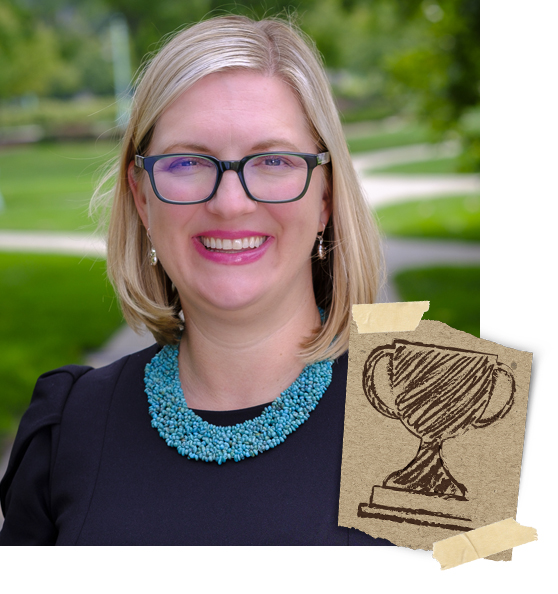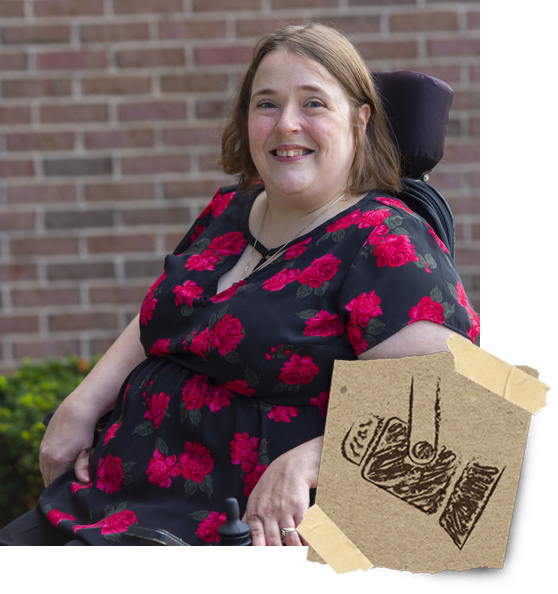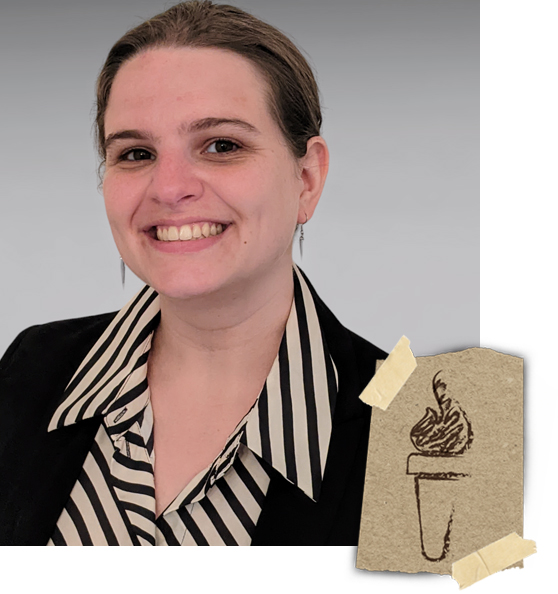Diversity Champion: Dr. Sarah Douglas
July 23, 2024 - Emily Jodway
 Sarah Douglas, an associate professor in Human Development and Family Studies and the director of the Research in Autism and Developmental Disabilities (RADD) Lab, is our Diversity Champion for the month of July. Each year on July 26 we celebrate Disability Independence Day, which commemorates the signing of the Americans with Disabilities Act in 1990 and giving those with disabilities the right to equal opportunities and services while protecting against employment discrimination. Dr. Douglas has been an educator for both children with special needs and college students, equipping them with the knowledge needed to support those children. This is her tenth year as an MSU faculty member.
Sarah Douglas, an associate professor in Human Development and Family Studies and the director of the Research in Autism and Developmental Disabilities (RADD) Lab, is our Diversity Champion for the month of July. Each year on July 26 we celebrate Disability Independence Day, which commemorates the signing of the Americans with Disabilities Act in 1990 and giving those with disabilities the right to equal opportunities and services while protecting against employment discrimination. Dr. Douglas has been an educator for both children with special needs and college students, equipping them with the knowledge needed to support those children. This is her tenth year as an MSU faculty member.
Douglas formed an awareness of intellectual differences and disabilities very early on, coming from a large extended family with big personalities and “a fair bit of neurodiversity.” This, coupled with experiences at her community church, gave her some of her first encounters with disabled individuals.
Douglas grew up in the late 1980s, at a period of time parallel with the beginnings of increased accessibility and the eventual signing of the Americans with Disabilities Act in 1990. She saw special education classes and students begin to be integrated into her school, rather than being housed in separate buildings. Growing up beneath the often stifling sun of Phoenix, Arizona, Douglas saw herself foregoing outdoor recess time and found refuge in the library. It was here that she had a chance conversation with a special education teacher, who approached her and other students, offering them to come hang out and play games in their classroom.
In this classroom, some of the students utilized communication boards and other types of picture-based systems to communicate and indicate their wants and needs. Without her even knowing it at the time, she had become a peer model for these students.
“That’s actually where I got my first exposure to a lot of what my research focuses on, which is augmentative and alternative communication,” she explained. “This is what individuals who have very limited speech use to communicate with others.”
Douglas decided to pursue a degree in education and became a special education teacher, later on returning to school and earning a master’s and eventually a PhD in special education from Penn State. During her time as a teacher, she encountered a wealth of learning experiences that she would later carry into her research and education on the subject to college students. Teaching a variety of students with differing levels of disability forced her to think about teaching and communication in new and unique ways. With the majority of her classroom utilizing visuals to support learning, she recalled a time in which she used this different way of thinking encountered a roadblock when a new student who was blind came to the school.
“That was my practical year for my master’s degree, so I did a project learning how to support her needs and how to make tactile materials to support her,” she said. “I worked really closely with the vision teacher from the Arizona School for the Deaf and Blind to make that work for that student.”
While at Penn State, Douglas focused much of her research on children with autism and developmental disabilities, a group which has a large percentage of disabled individuals with significant communication challenges. She is especially passionate about assisting families and paraprofessionals in the support and care of their autistic children.
“I have love for all individuals with autism and the potential challenges they may go through; I know that for families, it can be a really critical challenge and very difficult for them to navigate,” Douglas explained.
Shortly after receiving her doctorate, a colleague shared with Douglas a posting for a tenure track position at Michigan State. Having recently given birth to her first child and feeling ready for a change, she applied for the job and was accepted. With an extensive background in special education, working in Human Development and Family Studies (HDFS) particularly appealed to her for its emphasis on education and community partnerships.
“I have a really strong feeling about the importance of education across domains; a kid is not just at school, they’re in a community, at home, in church settings, all of those things. With HDFS, I knew I could spend more time looking at those settings, and would have more flexibility to work with families and find out what matters to them.”
With her students and in the RADD lab, Douglas does just that. Her undergraduate class this semester has a lab component which sends students out into inclusive classrooms, inclusive play groups in the community, and join home visitors in their trips to disabled children’s homes to educate families on early intervention. “They’re able to see the things that we’re talking about in class in action,” she explained. Students also participate in roleplaying activities and case studies in the classroom. Douglas teaches active listening skills to better interact with families, and gives them similar training that she would a communication partner supporting someone with Augmentative and Alternative Communication (AAC) needs, such as a text-to-speech tablet. The RADD lab recently started a study abroad program, where students travel to Ghana to see child development and support for children with disabilities through a different cultural context.
“It is really fun to work with undergrads because they’re so interested in learning and preparing for their future careers and trying to understand the problems we are facing in the classroom and the lab,” Douglas added. “The better I can prepare our future teachers to have as much of these skills that they need, I think the better able they will be to handle the challenges they’re going to face in the classroom.”
Douglas sometimes finds it difficult to speak for the children and families that she supports, and believes that their voices are the ones we should hear and who should be sharing their stories. But she also sees the importance of advocacy and having allies to support and rally around these individuals, joining them in their pursuit of greater accessibility and increased government funding and policy.
“Having worked closely with children, adolescents and even adults with disabilities, I can say with certainty that all people have very rich experiences to share with the world, and that we should always presume competence. We may not know what’s in their mind because they are unable to share it at that moment in time. Many of them just don’t have the voice to do that yet. But hopefully over the course of their lifetime, that will be available to them, and I’ll be there standing with them until they can.”
Read more:

Diversity Spotlight
Alumni
Laura Hall
Laura Hall is an MSU graduate with a bachelor's degree in Elementary Education and Teaching and a master's in Social Work. She is currently the Assistive Technology Program Co-Director at Michigan Disability Rights Coalition and has over 12 years of experience working with Assistive Technology to help individuals with disabilities in their daily life.

Diversity Torch
Student
Livy Drexler
Livy Drexler is an anthropology PhD candidate at MSU with a focus in medical anthropology. A former special education student and an older sibling to two autistic brothers, Drexler is interested in cultural competency in special education programs that serve Native American students, cultural constructions of disability, and community based participatory action research.

Diversity Matters
We strive to cultivate an inclusive and welcoming college environment that celebrates a diversity of people, ideas, and perspectives.

